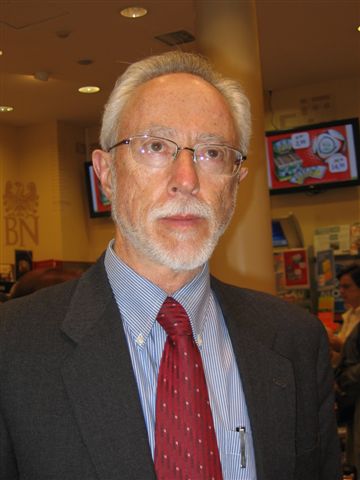„Es ist nicht die Sprache, die den Menschen zum Menschen macht, sondern die Sprache der anderen.“
In the Heart of the Country
John Maxwell Coetzee [kʊtˈsiː, kʊtˈsiə] ist ein südafrikanischer Schriftsteller; seit 2006 ist er australischer Staatsbürger. Er wurde als erster Autor zweimal mit dem Booker Prize ausgezeichnet und erhielt im Jahr 2003 den Literaturnobelpreis. Wikipedia

„Es ist nicht die Sprache, die den Menschen zum Menschen macht, sondern die Sprache der anderen.“
In the Heart of the Country
„Auf den Stachel des Begehrens haben wir nur eine Antwort: fangen, einschließen, festhalten.“
In the Heart of the Country
Tagebuch eines schlimmen Jahres
„Von allen Abenteuern ist Selbstmord das literarischste, mehr noch als Mord.“
In the Heart of the Country
Tagebuch eines schlimmen Jahres
Tagebuch eines schlimmen Jahres
Life and Times of Michael K
Tagebuch eines schlimmen Jahres
Tagebuch eines schlimmen Jahres
„Schmerz ist Wahrheit; alles andere wird angezweifelt.“
Waiting for the Barbarians
Tagebuch eines schlimmen Jahres
„Konkurrenz ist eine Sublimierung von Krieg.“
Tagebuch eines schlimmen Jahres
Tagebuch eines schlimmen Jahres
„Charakter ist Schicksal. Historie ist Gott.“
In the Heart of the Country
Tagebuch eines schlimmen Jahres
Life and Times of Michael K
Tagebuch eines schlimmen Jahres
Tagebuch eines schlimmen Jahres
„So funktioniert Höflichkeit. Man pflegt Beziehungen mit Leuten, auch wenn man sie nicht mag.“
Tagebuch eines schlimmen Jahres
„Erklären heißt verzeihen, erklärt zu werden heißt Verzeihung erlangen […]“
In the Heart of the Country
Tagebuch eines schlimmen Jahres
Tagebuch eines schlimmen Jahres
„Vergnügen ist Mangelware, aber an Schmerz ist heute überall ranzukommen.“
In the Heart of the Country
Tagebuch eines schlimmen Jahres
Tagebuch eines schlimmen Jahres
Schande
Life & Times of Michael K (1983)
Kontext: He closed his eyes and tried to recover in his imagination the mudbrick walls and reed roof of her stories, the garden of prickly pear, the chickens scampering for the feed scattered by the little barefoot girl. And behind that child, in the doorway, her face obscured by shadow, he searched for a second woman, the woman from whom his mother had come into the world. When my mother was dying in the hospital, he thought, when she knew her end was coming, it was not me she looked to but someone who stood behind me: her mother or the ghost of her mother. To me she was a woman but to herself she was still a child calling to her mother to hold her hand and help her. And her own mother, in the secret life we do not see, was a child too. I come from a line of children without end.
Life & Times of Michael K (1983)
Kontext: Though this is a large country, so large that you would think there would be space for everyone, what I have learned from life tells me that it is hard to keep out of the camps. Yet I am convinced there are areas that lie between the camps and belong to no camp, not even to the catchment areas of the camps — certain mountaintops, for example, certain islands in the middle of swamps, certain arid strips where human beings may not find it worth their while to live. I am looking for such a place in order to settle there, perhaps only till things improve, perhaps forever. I am not so foolish, however, as to imagine that I can rely on maps and roads to guide me. Therefore I have chosen you to show me the way.
“Perhaps if one flew high enough, he thought, one would be able to see.”
Life & Times of Michael K (1983)
Kontext: I could live here forever, he thought, or till I die. Nothing would happen, every day would be the same as the day before, there would be nothing to say. The anxiety that belonged to the time on the road began to leave him. Sometimes, as he walked, he did not know whether he was awake or asleep. He could understand that people should have retreated here and fenced themselves in with miles and miles of silence; he could understand that they should have wanted to bequeath the privilege of so much silence to their children and grandchildren in perpetuity (though by what right he was not sure); he wondered whether there were not forgotten corners and angles and corridors between the fences, land that belonged to no one yet. Perhaps if one flew high enough, he thought, one would be able to see.
“A book should be an axe to chop open the frozen sea inside us.”
Quelle: Summertime
Quelle: Disgrace (1999), p. 3-4
Kontext: Although he devoted hours of each day to his new discipline, he finds its first premise, as enunciated in the Communications 101 handbook, preposterous: 'Human society has created language in order that we may communicate our thoughts, feelings, and intentions to each other.' His own opinion, which he does not air, is that the origins of speech lie in song, and the origins of song in the need to fill out with sound the overlarge and rather empty human soul.
“Pain is truth; all else is subject to doubt.”
Quelle: Waiting for the Barbarians
“Was it serious? I don't know. It certainly had serious consequences.”
Quelle: Disgrace
“Our lies reveal as much about us as our truths.”
Quelle: Slow Man (2004)
“Degrees of obscenity,” she replies.
Quelle: The Lives of Animals (1999), pp. 43-44